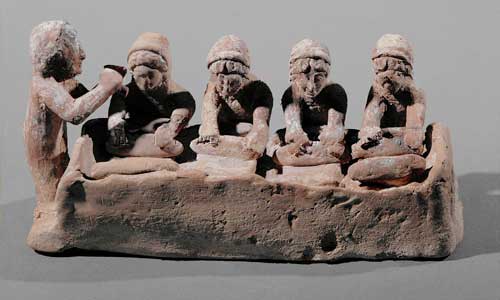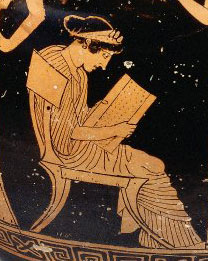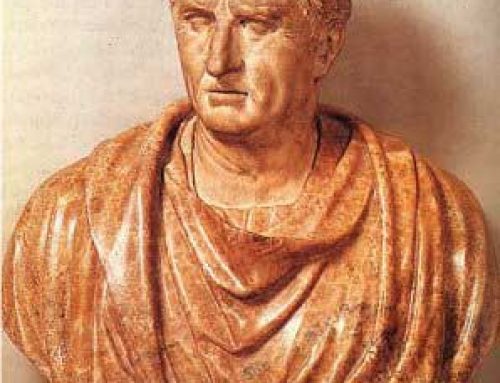
Ancient Greek women kneading bread while a flute player keeps the production speed up. (Thebes, 500s BC, now in the Louvre)
A hard place to be a woman
Ancient Greece was a very hard place to be a woman. Many Greek women were enslaved. Some worked in bread factories, like this one, grinding wheat and barley into flour and baking the flour into bread.
Slavery in ancient Greece
The Greek economy
Women in early West Asia
All our ancient Greece articles

Ancient Greece: Women carry water at a public fountain
Other enslaved women worked in big perfume factories, or in textile factories, where they spent all day spinning wool and linen and then weaving it into big bolts of fine cloth for their rich owners to sell on the Silk Road.
History of spinning
And weaving
Many enslaved women worked on farms, planting and weeding the fields, then picking grapes and olives when they were ripe. Women – free or enslaved – cleaned houses or carried water or did wet nursing, childcare or elder care in free people’s houses. They took care of disabled or sick people. Some enslaved women worked as waitresses, or as entertainers for men’s parties or in bars.

Women’s work in ancient Greece: a textile production line (Amasis painter, about 540 BC)

A Greek woman making a large pot, in a pottery workshop (Caputi hydria, by the Leningrad painter. Athens, about 490-470 BC)
Male guardianship
Even free women couldn’t own land, so they still almost always had to live under the control of a man – their father or husband, or a brother or uncle.
Midwives and childbirth
History of straw
Some women ran their own businesses, selling apples or or garlands of leaves, straw hats or medicinal herbs. The woman shown here seems to be the boss of this pottery workshop. Women worked as midwives, delivering babies. Or, like enslaved women, they worked on men’s farms.

An enslaved nanny holds a baby
Public spaces were for men
Women milked sheep and goats and made cheese, and they fed chickens. They cooked and cleaned, nursed sick people, and did child care. Like enslaved women, they spent time spinning and weaving, but usually at home rather than in factories.
The family in ancient Greece
Greek houses
Greek men thought public spaces were only for men, so they kept their wives and daughters inside their houses or courtyards most of the time. Women weren’t allowed to vote or be on juries. Men thought it was rude even to say a woman’s name in public.

Ancient Greek women: Girls jump on a seesaw
Marriage and divorce
Greek women couldn’t go to school, fight in wars, vote, or be leaders, or act in plays. They didn’t sail on Greek ships. They couldn’t choose who they would marry – their fathers or brothers chose for them.
A Greek woman could divorce their husband, but he usually got custody of the kids. Women who were on their own, without a husband or brothers to support them, were especially badly off. Homer‘s Iliad mentions how “a woman carefully weighs the wool she has spun to earn a meagre wage and feed her children.” It was probably something like Afghanistan today.

A woman reads a scroll
Managing a big house
Women from rich families worked as managers, running a large household with dozens of slaves, children, relatives, and guests.
Clothing in ancient Greece
History of baskets
In addition to keeping everyone clean and fed, they often managed businesses out of their house, making and selling clothing or straw mats or baskets.

Girls swimming and diving in Ancient Greece ca.450 BC
Greek women had friends and played games
But women’s lives weren’t all about work. Women talked to their friends at the water fountain while the jugs filled.
Water and fountains
Religion in ancient Greece
The poet Sappho
They went to religious festivals and drank wine there, and danced together. Women learned to juggle and to swim, and to play music, and some women could even read and write poetry.
Women still held power
After all of this, you might be surprised to hear that women did still hold power. But throughout the ancient period, the Pythia at Delphi was always a woman. She charged high prices for her political advice to cities, and made Delphi rich.
The Delphic oracle
The battle of Salamis
And in the 400s BC, Artemisia ruled the Greek city of Halicarnassos, in Caria, in Ionia (modern Turkey). Artemisia led her ships into the battle of Salamis on the Persian side, and distinguished herself in the fighting. Women rulers became more common in the 300s BC, a second Artemisia ruled Caria too. Cratesipolis successfully ruled Sikyon in southern Greece, and Olympias ruled Epirus in the north.
Learn by doing: spinning
The Greek Family
More about spinning
More about Roman women
Bibliography and further reading about women in ancient Greece:
Eyewitness: Ancient Greece , by Anne Pearson.
Families in Classical and Hellenistic Greece: Representations and Realities, by Sarah B. Pomeroy (reprinted 1999). One of the first scholars to write about Greek women, and still one of the best.
Children and Childhood in Classical Athens, by Mark Golden (1993).
Women in Ancient Greece, by Susan Blundell (1995)






pretty good, if I do say so myself, especially for an old fashioned person.
Hello thanks this helped alot?
You’re welcome, Anna. I’m glad we could help.
this is lit bro thanks
You’re welcome!
I love this story
Thanks
It helped me with my project. Thanks. Teachers in my school are using it actively
That’s very good news! Tell them I said thank you, please!
This really helped me on my report, thanks!! By the way, this website looks great.
Thanks!
Thank you this was very helpful for my research project
I’m delighted to hear it, Sarah! Good luck with your project.
nice website
Thank you! That’s very kind of you.